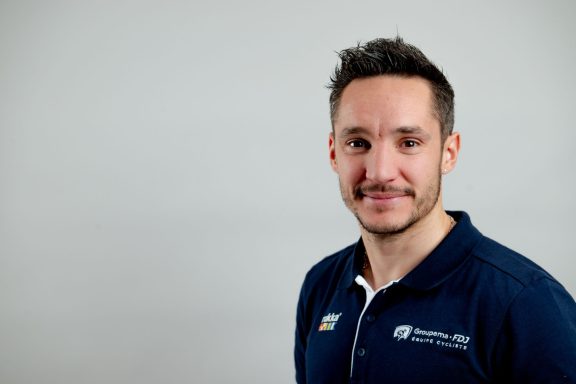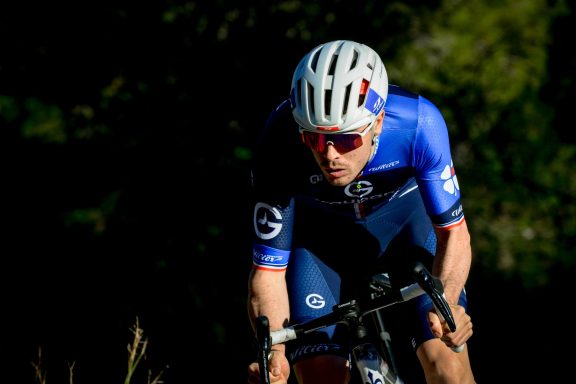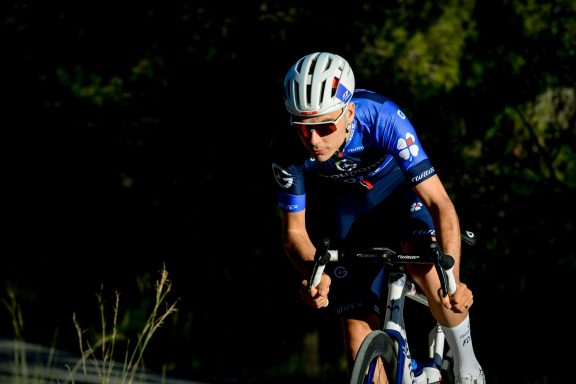In a few months, he will become the eighteenth rider in just five years to make the jump from “La Conti” to the WorldTeam Groupama-FDJ. At 21 years old, and after a very solid season as a U23 rider, Brieuc Rolland has earned his place in the “A” team for 2025. He sat down with us to look back at this crucial year, his development within “La Conti”, and his near future prospects.
Brieuc, the 2024 season is about to end. How satisfied are you with it?
If someone had told me that I would have a season like this last winter, I would have signed for it straight away! It was almost a dream season for me. I worked hard to get there. Not everything always goes as you want in cycling, but this season has been truly exceptional. Winning the Course de la Paix, coming fifth in Liège-Bastogne-Liège U23, finishing in the top 10 of the Tour de l’Avenir… These are things I dreamed of in the winter while I was training. When you’re riding in the rain, when the feeling is terrible and it’s freezing, you just think: I hope it’ll pay off.
“Everything that’s happened to me, I hoped for it deep down”
Last winter, you said you wanted to turn your top 10s into top 5s, podiums or even victories. Has the goal been completed?
For sure, and it’s rewarding. Everything that’s happened to me, I hoped for it deep down, and I hoped to reach a new milestone like I had already done by leaving Vendée U for La Conti. I’m also aware that it will be a completely different story next year. I told myself that I might have to wait a little while before experiencing such emotions again, so I took full advantage of each performance and each satisfaction I had this year.
Did you quickly feel that you had reached another level?
I have reached new steps every year since the juniors, and this season, it allowed me to perform in quite a few races. I felt after the winter that I had really reached a new level in different kinds of efforts. With all the data that we now have access to, I could already see that I had made good progress, but nothing equals racing. And on the Tour of Rwanda, I felt quite good even though it was just my return to racing, and then I managed to keep on going.
What is this obvious progression due to?
There is for sure physical maturity, which I think comes later for me than for others. Then, there is obviously work, and the desire to always try to do better. I also went on several personal mountain training camps; six times I think between last November and September. I was able to put on a good amount of work, spend time on the climbs and do various exercises. It’s an addition of different things. I also tried to be as professional as possible when the goals approached.
“When confidence sets in, it helps a lot”
We also noticed your consistency. Was it also a desire of yours?
People often pointed it out to me, and I think it’s something we finely balanced with my coach Maxime Latourte. It was indeed a choice to be able to be there throughout the year. Next year, it will be a little more complicated with slightly heavier workloads. In any case, I never felt tired this year and we managed to keep a good form throughout without me really feeling a need to take a break. I think it also did me good mentally to tell myself that every time I started a race, I could try to do something. It kept me really motivated. Could I have sometimes done even better by accumulating more loads before certain goals? I hope so, but we never really discussed it with Max because this way of working suited me well this year.
Was your victory in the Course de la Paix a turning point?
Above all, it confirmed the start of the season that I had done. I was always up there. I wasn’t getting the win, but I was always close. Winning was a kind of confirmation, a completion. I wanted to prove to myself that I was capable of putting my hands in the air, but doing it in such a race, I didn’t really expect it. Then, when confidence sets in, it helps a lot.
How important was your third place in the Polynormande with the WorldTeam?
It’s a great result, but even though I was with the WorldTour team, I approached it like any other race I did with the French national team or La Conti. Obviously, it feels good because it’s a pretty important result. It also came just before the Tour de l’Avenir, which was almost ideal. It was a bit of a surprise for me, it boosted my confidence again, and it proved to me that I was capable of performing on slightly different terrain with a different scenario, from a breakaway.
“I had to show the team what I was capable of”
What do you think is the biggest performance of your season?
The last stage of the Tour de l’Avenir left its mark on me. There was a bit of fatigue but being able to finish fifth at the top of a one-hour climb was something that meant a lot to me. I needed to prove to myself that I had the ability for this type of effort. It did me good from that point of view, it gave me a confirmation of the kind of rider I think I am. It was an important day, that’s for sure. It is perhaps my biggest performance of the season: an hour of climbing, facing yourself, without drafting, without tactics, where you just have to push on the pedals.
After two years with “La Conti”, how do you see your progress?
I am no longer the same rider as when I arrived. The team has honestly helped me to reach a big milestone. I have progressed where I wanted to. I am where I hoped to be. My ambition was not to win one race or another, but to reach this level. On the “threshold” type efforts in the mountains, I feel that I have really taken a huge step, I have also continued to progress in the “punchy” efforts. I am lucky to be able to say that everything is going a bit as I wanted, so once again, I am making the most of it. There is still a lot of work to do, but I am very well surrounded, and I lack nothing. This is also why I wanted to continue with Groupama-FDJ. A mutual trust was established. They are the ones who gave me a boost, they really developed me, and I hope that I will continue to progress, again and again, to reach the highest world level with this jersey.
You said at the beginning of the year that “moving to the WorldTour team had become [your] priority”. Now that it’s done, what does it mean?
It’s a source of pride, especially since it’s the team that offered me my first professional contract. They trusted me after my first season as U23. A bond was created, and I’m not indifferent to it. In any case, I told myself that if I got results, the contract would come with it. I didn’t say to myself: I have to move up to the upper league. I just told myself that I had to prove that I could belong there. I had to show the team what I was capable of. The staff gave me positive signs early on. When they told me that a contract was waiting for me: I just told myself: “now let’s keep confirming, and let’s redouble the efforts”. It takes away a little pressure, you think about it a little less, but I kept the same motivation: to get results. It didn’t change anything in my way of approaching races or even preparing for them.
“Moving up to the WorldTour is just a crossing point”
Do you already picture yourself as a WorldTour rider in 2025?
I’ve had a bit of time to realise it, especially since I’ve had the opportunity to do several races with the WorldTeam, including the Tour de Luxembourg lately. I also know that it’s just a crossing point. The goal isn’t just to move up to the next level. You need to stay motivated because I ride my bike to get results and win races. That’s really what drives me, and I know that the step is really, really high. Even though you’ve fought with the best U23 riders, when you get to the WorldTour, you’re absolutely nobody. Everything restarts from scratch, and I actually like having to prove myself.
You won’t come in a totally unknown environment, thanks to the exchanges between Conti and WorldTour teams.
True. The exchanges allow you to see where you are within a professional peloton, to know what you still need to work on. You can see where you stand a bit better. It also allows you to get used to the staff and the riders already, and all of that also makes it easier to move up to the next level. I may not have competed in enough big races to gain proper experience, but I would say that it allowed me to see the level required to perform, and that’s always better than if I hadn’t had these opportunities.
Philippe Mauduit highlighted your tactical qualities. Is that something that characterises you?
That’s nice of Philippe. Let’s say that I always try to stay calm during the race, to take a moment, analyse the situation and understand who’s doing what. Then, I try to feel when it’s the right time, to “smell” the right move, but it doesn’t work every time (smiles). It also requires knowing your opponents and the terrain.
“I would like to keep this climber-puncher profile”
What would you like to improve in the coming months?
I would like to continue to improve my climbing and my explosiveness. Mountains and general classifications are what I have dreamed of since I was little. It’s what got me into cycling. It will involve a lot of work but also advice from older riders, like David. I would like to keep this climber-puncher profile. We saw again with David in Luxembourg that punch is useful to win races. It’s an important quality to have. The puncher is the rider who wins races, with the sprinter. I don’t think that having only the climber’s slow fibres is ideal.
Does David’s profile inspire you?
Of course. We were actually roommates in Luxembourg. He’s really a rider I like, because of his profile and in his way of racing. I can’t wait to work with him. Plus, he’s from Brittany! In Luxembourg, he gave me some advice during the race, but in general, he was mainly there to reassure me, on my level, my potential, and on the next steps to take. I wouldn’t go so far as to say that he was like a big brother, but he took me under his wing and really gave me comfort.
What do you hope for next year?
Above all, to discover the highest level, the WorldTour races, the Classics, the one-week races. Obviously, I would like to do my first Grand Tour, but only if my physical abilities allow me to. If you don’t have the required level to do a Grand Tour, there’s no point in getting beaten up for three weeks. I will obviously train to get results because that is what drives me, but once again, the level is extremely high nowadays, already in Australia in January. All the races are very hard to win. This first year will allow me to gain experience, to build up my strength. We will see if I can get results, but I will not worry too much about it, especially since I do not think that will be my job next year.



No comment